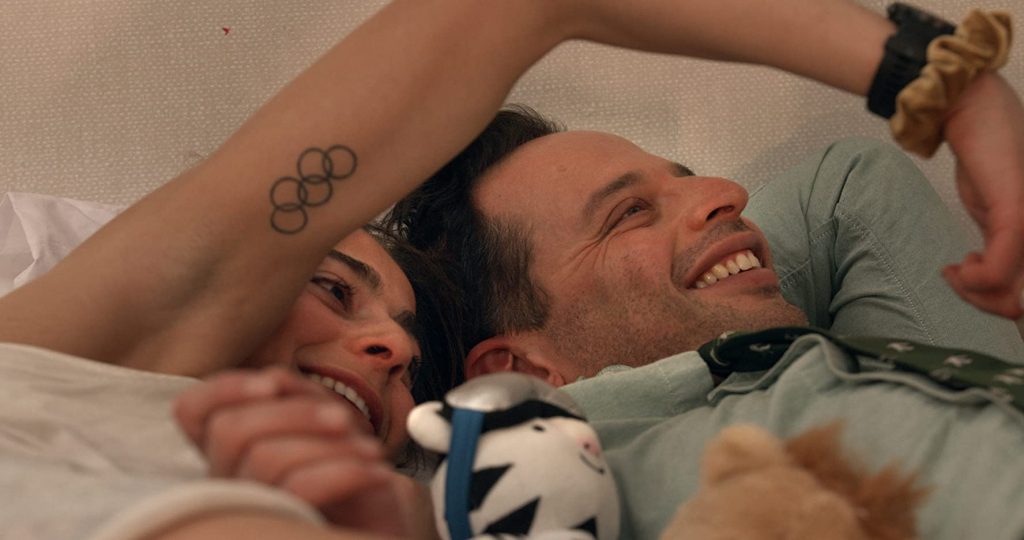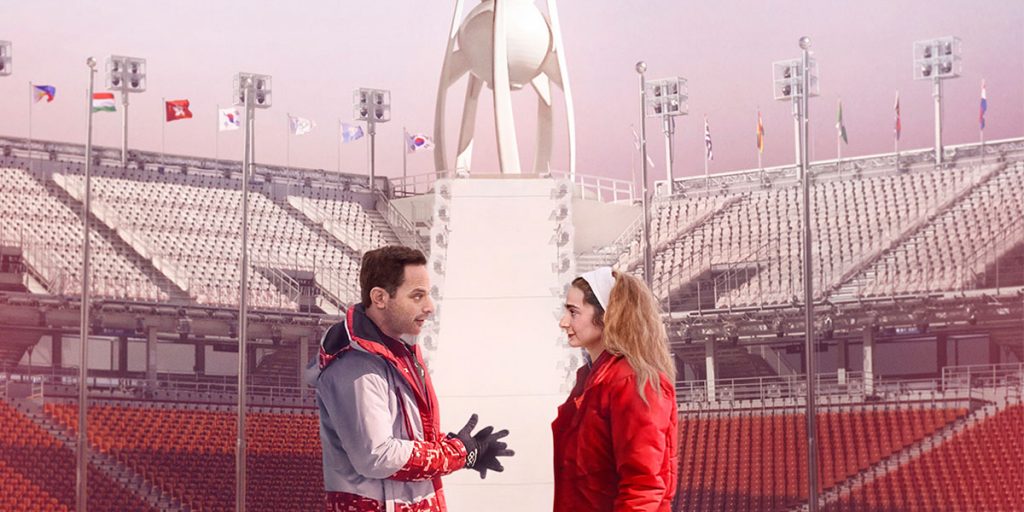Olympic Dreams ambles through a romance in front of the fascinating backdrop of the 2018 PyeongChang Winter Olympics.
When I was eleven years old, my family travelled to Atlanta to go to the ’96 Olympic Games. We spent the next two weeks in a whirlwind of sports – everything from baseball and basketball to wrestling and weightlifting. What actually sticks with me the most was the overwhelming sense of global community throughout the city. Beyond the ubiquitous spray fans and the unceasing beats of the Macarena, it left an impression to see so many people come together through sports. Each event seemed to begin with a conversation with the people around you about their countries of origin. Each restaurant seemed an excuse to strike up a conversation. Even the streets themselves led to good natured ribbing about medal counts and the chance to trade little keepsake pins.
Olympic Dreams seems to be captured by the same spirit: the dizzying array of different people all smashed together. The film tells the story of the meeting and flirtation between an Olympic Village volunteer dentist and a cross country skier at the 2018 PyeongChang Olympic Games. Their story steals liberally from better films such as Before Sunrise and Lost in Translation, but the energy of the setting really gives the story a burst of life. Olympic Dreams was filmed in and around the Olympic Village during the actual 2018 Games.
A bit of background seems essential here. Historically, the Olympics used to celebrate global arts, as well as sports. In the window from roughly World War I through World War II, the Games would give out actual Olympic medals for artistic pursuits such as sculpture and writing. In an effort to recapture that spirit, the Olympic Committee announced it would be creating an artists-in-residence program that would bring former Olympians back to the games to pursue the arts. Alexi Pappas, producer, star and co-writer of Olympic Dreams, was on the recipients. Pappas, an independent film veteran who made Tracktown, was a distance runner at the 2016 Summer Olympic Games.

It leads to a film that will serve, at the least, as a fascinating historical artifact. Filmed guerrilla-style, it is captivating to see the athlete dining halls and massage chair-filled recreation rooms. Despite the billions of eyeballs that will see them compete, the athletes are packed into tiny ascetic prefabricated dormitories. Emotionless white walls encircle their every move in the Olympic Village, which makes for a stark visual contrast with the nearly always garish Olympic Team apparel each athlete wears. The film’s few scenes outside of the Olympic village out in PyeongChang are a vibrant colorful affair of nightclub lights and hole in the wall restaurants. These scenes serve as a lovely grace note of two outsiders bonding over the shared experience of an alien culture. Pappas wisely leaves any statements about the commodification of athletes beneath the text, but it is clear she is interested in touching upon a number of ideas here, beyond just the film’s core love story.
Having finished in 17th place in her Olympic event, Pappas is also able to bring perspective to the struggle of an athlete at the Games. It is no spoiler to share that Pappas’ character competes early in the film’s run time to middling results. Pappas, both as a writer and performer, effectively captures the strange loneliness and loss of purpose that accompanies devoting your life to something for years only to see it turn out in disappointment.
One of the most interesting things about Olympic Dreams is the filmmakers’ decision to fill all the supporting roles with actual Olympic athletes (they’re even credited with their sport and country). Many of them are uncomfortable, ineffective presences on screen but it helps grant a surreal documentary-esque feel to many of the film’s scenes. Olympic skier Gus Kenworthy makes a noteworthy appearance here. He has an effortless screen charisma and manages to make his dialogue feel more vibrant than his co-stars.
I have, of course, neglected to say much about the film’s primary plot – an awkward romantic story. Nick Kroll (Loving, FXX’s The League) plays the male lead, an underwritten dentist with a complicated ex situation back home. Kroll is quite good here, actually. He does a good job working with the athlete-actors, a tribute to his background in stand-up and improv. He and Pappas have a strong chemistry together too, but the film is indecisive in what the relationship means to the characters. On the one hand, the screenplay repeatedly emphasizes their age gap as a chill on the couple’s romantic possibilities; on the other hand, the film’s strongest character moments are the more flirtatious scenes between the two. The whiplash effect leaves the characters to feel inconsistent and underwritten: too much spark for the friendzone and too much chastity for romance. The romantic tension becomes annoying instead of engrossing. I suspect the guerilla filmmaking led, by necessity, to a performance style closer to mumblecore improv than fully realized characters.
Olympic Dreams is a very frustrating film for me. There is a great deal worthy of admiration, here, but the film’s core plot simply does not work well enough despite the best intentions of the creative team.
Olympic Dreams is now available to watch at home.

